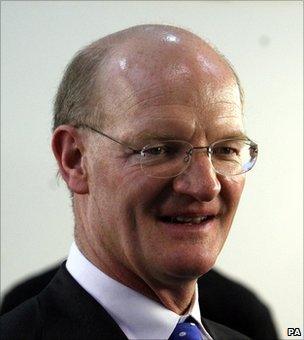David Willetts warned over science cuts by universities
- Published

Mr Willetts has asked for evidence that the UK is becoming less attractive place to do research
Deep cuts in the UK science budget will harm the research base, universities and the economy, the heads of six leading universities have warned.
Their views are in a letter from the Lords science and technology committee to Science Minister David Willetts.
They say the best researchers will move to countries that are investing more in research and development.
The government said it was "committed to making the economic case for science and innovation".
According to Lord Krebs, who is chair of the House of Lords select committee, says: "In a world where talent is highly mobile, a widening of the funding differential, whether real or perceived, between the UK and our competitors will put at risk the ability of the UK to continue to recruit and retain the very best brains."
He added that it would also jeopardise the country's ability "to maintain the highest standards of research, for which the UK is renowned and from which the UK has been able to reap significant commercial benefit".
Recruiting challenge?
When he gave evidence to the science and technology committee on 13 July, Mr Willetts invited them to provide evidence to support their concerns that the UK is becoming a less attractive place for to science research.
The committee wrote to the vice-chancellors of six leading research universities for their experiences of the challenges of recruiting and retaining the best talent in science.
According to Lord Krebs, their responses showed that the committee was right to be concerned that worsening differentials in funding between the UK and other countries would be damaging to efforts to attract and retain the best scientists.
Professor Andrew Hamilton, vice chancellor of the University of Oxford, said: "We have very real concerns that the brightest and best researchers at all stages of their career could accept offers of study or employment at our international competitor institutions should the national funding environment become more challenging."
Referring to the current high ranking of UK universities in international league tables, he commented: "Such reputations were hard won, but could easily be lost through a reduction in funding."
Professor Malcolm Grant, president and provost of University College London (UCL), suggested that these were "deeply worrying times for the research-intensive universities... The painstaking work of the past two decades could quite quickly be undone were scholars around the world to become apprehensive about the future commitment of the UK government to science and their willingness to support its leading centres within Britain."
Sir Keith O'Nions, rector of Imperial College London, suggested that it was too early to assess the effects of recent and proposed funding cuts. He noted that the numbers of Imperial College academic staff moving overseas had increased from 8% to 24% of their turnover in the last five years.
The number of Imperial staff focussing on research who had moved overseas in the last five years had increased from 15.1% to 22.8%.
'Rigorous scrutiny'
A spokesperson for the Department for Business, Innovation and Skills said: "Mobility of researchers between countries is an important feature of modern academic research. The UK has historically benefited from a net inward migration of research staff. The government recognises the importance of ensuring that the UK continues to be a world-leading place to do science.
"Research, technology and innovation will play a key role in rebalancing the economy and we want science to emerge from these tough economic times to be strong, sustainable and effective. That's why we are committed to making the economic case for science and innovation.
"We cannot speculate on the spending review while the process continues. Public spending on science, just like everything else has to stand up to rigorous economic scrutiny. In these austere times, the public should expect nothing less."
The letter follows recent remarks by the Business Secretary Vince Cable that the scientific community could do "more for less" and that "something in the order of 45% of the research grants that were going through were going to research that was not of excellent standard".
This quickly became reported as the taxpayer funding "mediocre" research, and according to James Wilsden, director of the UK Royal Society's Science Policy Centre, this "is being spun as a justification for budget cuts." He says that 90% of funding is for research that is rated as "world class".
Scientific bodies have been arguing for some months that science should be protected from spending cuts - on the grounds that the UK's research base attracts inward investment - and generates hi-tech jobs and wealth.
The precise figure for cuts to the government's research budget is likely to be finalised internally very soon. But many fear in light of Mr Cable's comments that no special case will be made for science - and there may be cuts of up to 25%.